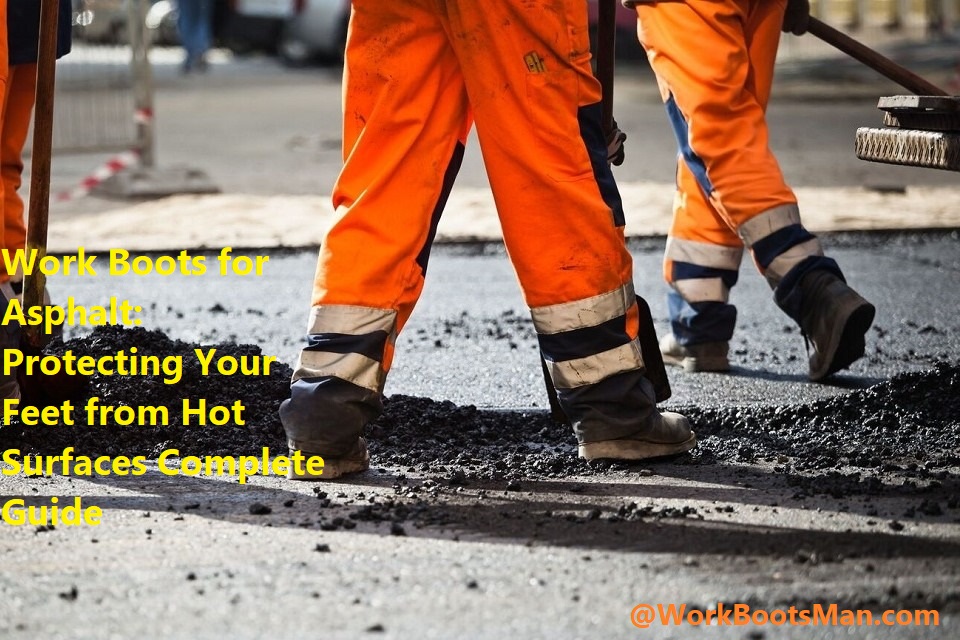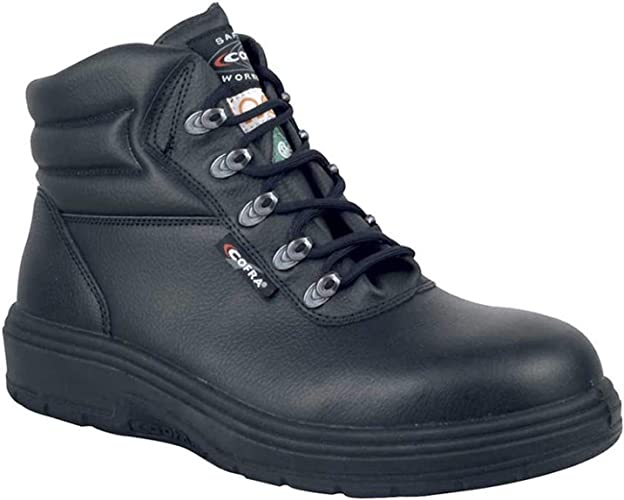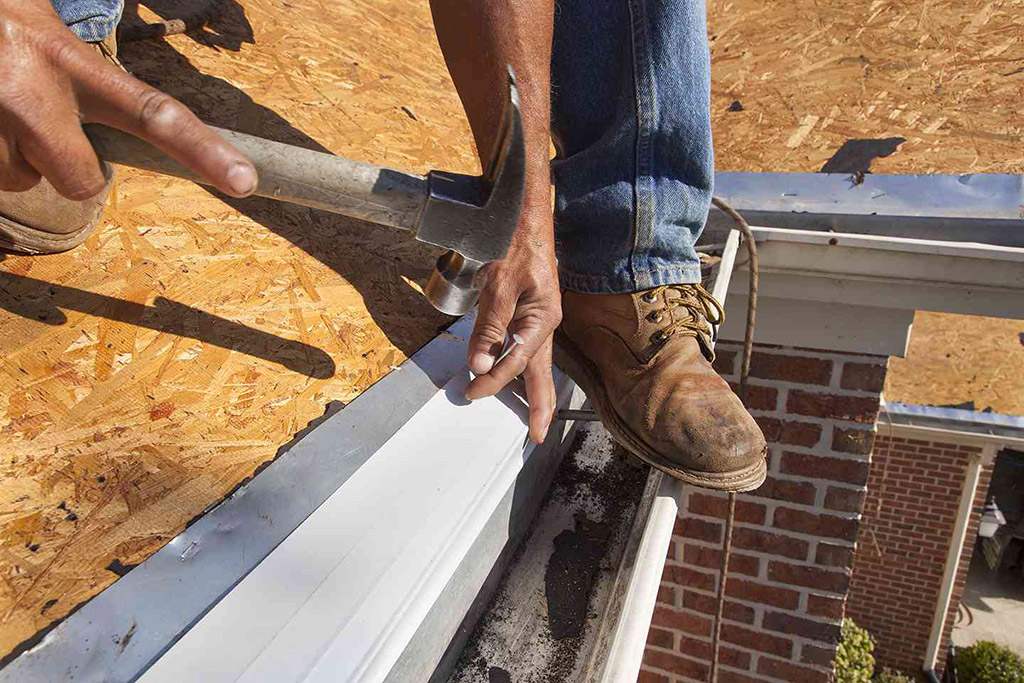Are you walking on hot asphalt, struggling to keep your feet safe and comfortable? You need the best work boots for asphalt, so let us show you how.
You’ll be able to work with confidence knowing that your feet are adequately protected from the heat. Read on to learn more!
When working with asphalt and hot surfaces, it’s essential to find the right type of footwear that will provide protection and safety while still allowing you to perform your job tasks. It’s important to work with a splinter-resistant material that won’t let in heat. Natural leather is one of the best, most durable materials for making work boots for hot surfaces. However, synthetic materials like nylon and polyurethane can also be used. Some features that make boots suitable for asphalt paving include flame retention, oil resistance, comfort, good fit, wear resistance and arch support.
We have done extensive research on the best protective boot for asphalt paving and compiled a comprehensive guide about varieties on the market as well as key features to consider before you buy shoes for hot surfaces. Read on for all the information you need to have an informed shopping experience when looking for pavement boots so you can perform your job safely and confidently no matter what type of terrain or environment you are working in.

Importance of wearing work boots for asphalt work
When working with hot asphalt, it is essential to wear proper protective footwear to prevent a range of injuries and illnesses. In addition to safeguarding your feet, this type of footwear provides comfort, stability and shock absorption. The right work boot should be lightweight enough that you can perform your tasks without feeling weighed down. Selecting a work boot designed specifically for asphalt work will ensure that the soles are heat-resistant and sturdy enough to handle the terrain of the job site.
Asphalt can reach temperatures as high as 150°F (65°C), and it remains extremely hot long after its application. Specialized work boots often feature double or triple layers of hard-wearing leather on their uppers, which helps protect against cuts from sharp rocks or gravel. The soles should be designed with reinforced rubber that will not melt even in prolonged direct contact with extreme temperatures, such as those found during asphalt paving projects. They also should have slip-resistant treads for added protection against accidents caused by slipping on wet or smooth surfaces.
Having the right kind of footwear for every paving project is essential for ensuring both job safety and protection against heatburns. Wearing proper work boots when dealing with hot asphalt can help reduce the risk of accidents due to slipping or falling on slippery surfaces, avoiding possible foot injuries sustained from stepping on sharp objects such as rocks or nails hidden in asphalt rubble, and protecting feet from burns due to direct contact with hot asphalt surfaces while laying down pathways or curbside repairs.
Features of work boots for asphalt
When selecting a pair of work boots for walking on hot surfaces, some key features should be taken into consideration. It’s essential to choose work boots that are heat resistant and slip-resistant, as well as comfortable and lightweight.
Heat-Resistance: Work boots with heat resistant properties will protect your feet from extreme temperatures such as hot asphalt or even molten steel. Look for models with a sole made from material that can withstand temperatures up to 500 F or higher.
Slip-Resistance: Since you may come in contact with oil or other liquids when working on an asphalt surface, it’s important to choose a pair of boots that offers good slip resistance. Look for outsoles designed with an aggressive tread pattern in order to prevent slips and falls.
Breathability and Comfort: Working outdoors in challenging conditions is hard enough without having uncomfortable and hot feet! Look for a pair of work boots with breathable lining, padded collars and insoles to keep your feet feeling cool and dry all day long.
Lightweight: Working on an asphalt job will require you to be on your feet all day – which means you’ll want lightweight, durable shoes that won’t add extra fatigue or muscle strain at the end of the day. Make sure your work boots are light enough for long hours of wearing them comfortably.
Heat-resistant soles and outsoles
One of the most important features to look for when selecting work boots for hot asphalt is a heat-resistant sole and outsole. This can help keep your feet protected against extreme temperatures. The rubber compound used on the outsole of your work boots should be designed to provide superior gripping and shock absorbing qualities while still providing protection against extreme temperatures. Additionally, the soles should be made with a minimum thickness rating to ensure that they can withstand hot temperatures without melting or degrading.
Heat-resistant outsoles should also have aggressive treads designed to enhance slip-resistance while walking on various surfaces such as asphalt, grass, concrete, mud, or snow.
Insulation and padding for comfort
It is essential to choose work boots that provide adequate insulation and padding to protect your feet from the intense heat of asphalt. The boots should have a well-constructed sole, cushioning in both the heel and toe areas, and well-ventilated upper layers. Insulated boots can help keep your feet cool, so be sure to look for boots with breathable qualities. Additionally, you should consider adding an extra layer of heat protection between the insole and outsole of the boot by getting an after-market heat resistant shoe pad. This will provide an extra layer of protection for your feet when walking on heated surfaces like asphalt.
Most rubber-soled work shoes have some degree of insulating properties but there are some specifically designed for use on asphalt. Look for a rubber sole with additional side insulation or compressed foam material that can provide extra shocks absorption when walking long distances on hot surfaces. It’s also important to look for upper layers made out of durable yet breathable materials like leather or synthetic fabrics that allow air circulation but still protect your skin from overheating or blistering due to friction and friction with hot surface materials such as stones and gravel found on roadsides.
Breathability to keep feet cool
Asphalt is a notoriously hot working surface, and it’s essential that you select breathable work boots to keep your feet cool in such conditions. Many people don’t realize that high-quality work boots are designed with breathability as an important factor, and not all boots will offer the same levels of ventilation.
Look for materials such as leather, suede and even certain types of rubber to allow air flow throughout the day. And when possible, choose slip-on or lace-up styles rather than pull-on varieties, since they’re often easier to get on and off but still provide good foot coverage. Additionally, select styles with mesh linings for added air circulation and comfortable wear all day long.

Steel toe protection
Steel toe protection is paramount for anyone who works in an environment where their feet may come into contact with dangerous machinery or hot surfaces. There are many work boots on the market designed to provide not only steel toe protection, but also maximum cushioning and support for your feet. When shopping for a pair of work boots, look for ones with an ASTM rating that offer both steel toe protection and good support.
Steel toe shoes help to protect the toes and feet from compression and impact injuries, such as falling objects or accidental contact with moving machinery parts. The steel reinforcement helps to deflect incoming force away from the foot, minimizing the severity of any potential injury. However, safety doesn’t end at metal reinforcement — cushioning is important too!
When you’re working on asphalt or outdoor surfaces that have been heated by intense sunlight, it’s important to select a pair of work boots that have been designed with temperature regulating technology in order to keep your feet cool and wick away moisture. These features are especially important if you’re working in elevated temperatures like those experienced near the equator or during summer months in more moderate climates. Look for boots made with breathable mesh inserts, moisture-wicking liners, perforated uppers, and/or oil-resistant polyurethane outsoles that can help reduce heat build up inside the boot.
Slip-resistant for safety
When working on asphalt surfaces, slip-resistant soles are possibly the most important factor you should be looking for when it comes to choosing a pair of work boots. If your job requires you to walk on hot asphalt or other rough surfaces, then slipping is not just inconvenient – it can be dangerous. It’s essential that you buy a pair of work boots with anti-slip soles so that can provide you with the necessary traction and stability in order to prevent dangerous falls and ankle sprains.
To ensure your safety when walking on asphalt, look for shoes that feature SlipGrips – rubber soles infused with special patterns to help provide extra grip in slippery conditions. Additionally, look for non-marking compounds that have been added to the rubber soles which will stop them from leaving scuff marks on light surfaces.
For extreme surfaces like hot asphalt, consider shoes equipped with Vibram’s XS Work sole – a rubber sole designed specifically for industrial use. This sole clings closely to both wet and dry surfaces and provides superior traction compared to alternatives like plastic or leather outsoles. The Vibram XS sole is also oil resistant and allows your feet to stay comfortable regardless of how long you stay on your feet.
Maintenance and care of work boots for asphalt
Maintaining and caring for your work boots is one of the most important parts of wearing them. Properly caring for your boots helps keep them looking good and it also helps prolong their useful life so that you have a reliable pair of work boots on hand when you need them.
You should always clean your work boots after each use and before storing them to avoid mold and bacteria buildup. This can be done by using a stiff brush and a mild detergent in water to gently remove dirt and debris from the boot’s surface. Make sure to dry your boots completely, away from direct sunlight or other sources of heat, before storing them in an area with enough ventilation.
Regularly inspecting your work boots can help detect any wear or tear while they are still in good condition, replacing any worn-out pieces as soon as possible to prevent further damage or discomfort. Any worn pieces should be replaced with ones that are specifically designed for asphalt surfaces for maximum protection. It is also advisable to use shoe trees when storing your work boots to maintain their shape.
Finally, regularly apply leather conditioners on the exterior of your Boots For Asphalt to improve their appearance and help protect the leather from abrasion during wear. Depending on the material used in the construction of your boots, specific cleaning agents may need to be used —always read product labels carefully! Following these simple steps will go a long way toward ensuring that you get optimal performance out of your Boots For Asphalt for years to come.
Cleaning and drying after use
Once you’re done putting in a hard day of work on the asphalt, there are a few things you need to do in order to keep your boots in tip-top condition.
The most important step is to make sure they are clean and dry before storage. Wiping them off with a damp cloth and drying with a soft cloth afterwards will help keep the leather intact and won’t allow dirt and debris to build up over time.
If your boots are particularly dirty, you may want to look into using mild soap or cleaning solutions created for leather. Follow the instructions carefully, as using too much soap can damage the leather of your boots over time. After cleaning them, be sure to rinse off any excess soap or cleaning solution that could remain on their surface.
In cold climates, it’s important to avoid leaving wet shoes out overnight or exposing them to temperatures below freezing as this could cause damage or discoloration of the material. Allow them to air dry until completely dry before storing away for long-term use. In hot climates, humid conditions can also cause problems so keep an eye on how your shoes respond when exposed to extreme temperatures and climates throughout the year.
Inspecting for damage or wear and tear
It is important to inspect your work boots for any signs of damage or wear and tear. If a boot has worn soles or creases in the leather, it might not be able to provide adequate protection from hot surfaces. Look at the stitching on the boot and check for cuts or breaks in the fabric, as these can potentially expose you to the heat of asphalt.
Additionally, check for any signs of stretching which might cause a gap in protection allowing heat to come through when you walk across an asphalt surface. Lastly, examine your boot laces; if they are fraying or coming undone they need to be replaced before using them on an asphalt surface.
Taking these steps will help ensure your feet stay safe while working on hot surfaces.
Replacing worn out boots
Asphalt work can involve standing for long periods, walking for miles, and running around frantically. All of this takes its toll on your feet, but replacing worn out shoes is essential to protect your feet from hot asphalt surfaces and other job site hazards. Investing in the right pair of boots to fit your specific needs can keep you safe while working asphalt.
When choosing footwear, make sure you select a size and width that fits snugly as work boots that are too large or too small can cause blisters or put an excess amount of pressure on certain areas of the foot. The material should be light but also offer enough cushioning to protect the toes from bumps and drops. Asphalt work boots typically have reinforced soles that provide maximum heat insulation – especially those with felt or rubber midsoles – so be sure to inspect the sole material carefully before buying. When hot asphalt is in contact with your feet, look for any waterproof layers in the boot’s upper and shank area, which help air out any sweat accumulation.
The treads also play an important role when it comes to finding a good pair of work boots for asphalt surfaces – aggressive treads give you extra traction but aren’t appropriate if you do a lot of walking; whereas deep lugged calks are better suited for construction sites since they add extra grip on soft mud and slippery surfaces such as snow or ice. Finally, keep in mind that high-ankle designs will provide additional protection against any sharp pieces such as rebar or jagged rocks underneath the surface so make sure you select accordingly based on your job requirements.

Conclusion
Asphalt work can be incredibly hazardous, so it is essential to make sure that you are wearing the proper boots. Asphalt can become dangerously hot, and you need to have adequate protection on your feet. Look for shoes with thick leather, durable midsole layers, a large toe box area, oil resistant outsoles and an overall snug fit. Additionally, consider adding steel toes or other reinforcements to your boots so that you are providing yourself with maximum protection. Taking the time to find appropriate work boots will save your feet in the long run.
FAQs
What kind of safety shoe used by workers handling hot asphalt?
Safety shoes with heat-resistant soles are used by workers handling hot asphalt.
What boots are best for asphalt?
Boots made with heat-resistant materials such as leather and rubber are best for asphalt.
What do you wear for asphalt?
Workers handling asphalt wear boots, protective clothing, and gloves to prevent burns and other injuries.
How do you prevent heat rash on work boots?
Wearing breathable socks and using talcum powder can help prevent heat rash on work boots.
What shoes are good for hot feet?
Breathable shoes made with lightweight materials like mesh or canvas are good for hot feet.
What shoe material is best for hot weather?
Materials like mesh, canvas, or other breathable fabrics are best for hot weather.
Which PPE are heat resistant to cover the feet?
Heat-resistant boots made with materials like leather or rubber are used to cover the feet.
What are the PPE for hot work?
PPE for hot work includes heat-resistant gloves, clothing, and eye protection in addition to heat-resistant boots.
What is added to the safety shoes that resist heat?
Materials like Kevlar, Nomex, or other heat-resistant materials are added to safety shoes to make them resistant to heat.
What do you call a PPE that is used to protect feet from hot metal and sparks?
Footwear that protects feet from hot metal and sparks is called safety or work boots with steel-toe caps or metatarsal guards.
See Also :
- Best wellington work boots 2023
- Best keen work boots 2023
- Best work boots for overpronation 2023
- Best work boots for sweaty feet 2023
- Best wellington work boots 2023

